This Could Be Us: Radical History at UC Davis
Posted: September 15th, 2022 | Author: ucdcoc | Filed under: Disorientation Guide '22-'23 | Comments Off on This Could Be Us: Radical History at UC Davis
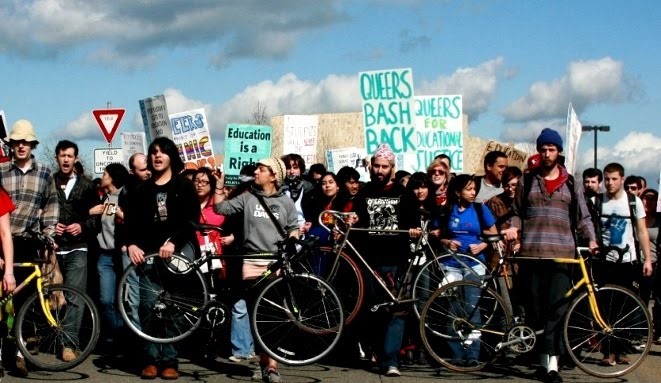
From occupations to protests, labor struggles to animal liberation actions, UC Davis has long been the site of radical actions that seek to transform the university and the world beyond. This timeline presents a non-exhaustive list of radical moments in UC Davis history. Let’s add to it together.
April 15, 1987: ALF Arson
What may be the first use of arson for the purpose of animal liberation in the United States occurs at the John E. Thurman Veterinary Diagnostic Laboratory, an animal research lab at UC Davis. In one of the earliest Animal Liberation Front actions in the US, ALF activists set fire to the lab and nearby vehicles, causing $5.1 million dollars in damage. No one has ever been indicted.
April 20, 1997: Primate Research Center Occupation
Animal rights protesters vandalize and occupy the California Regional Primate Research Center, holding the building for over four hours. After a standoff and some police violence against the protesters, cops arrest thirty-two people. One month earlier, ALF claimed responsibility for the arson of a research facility that resulted in $1000 in damage.
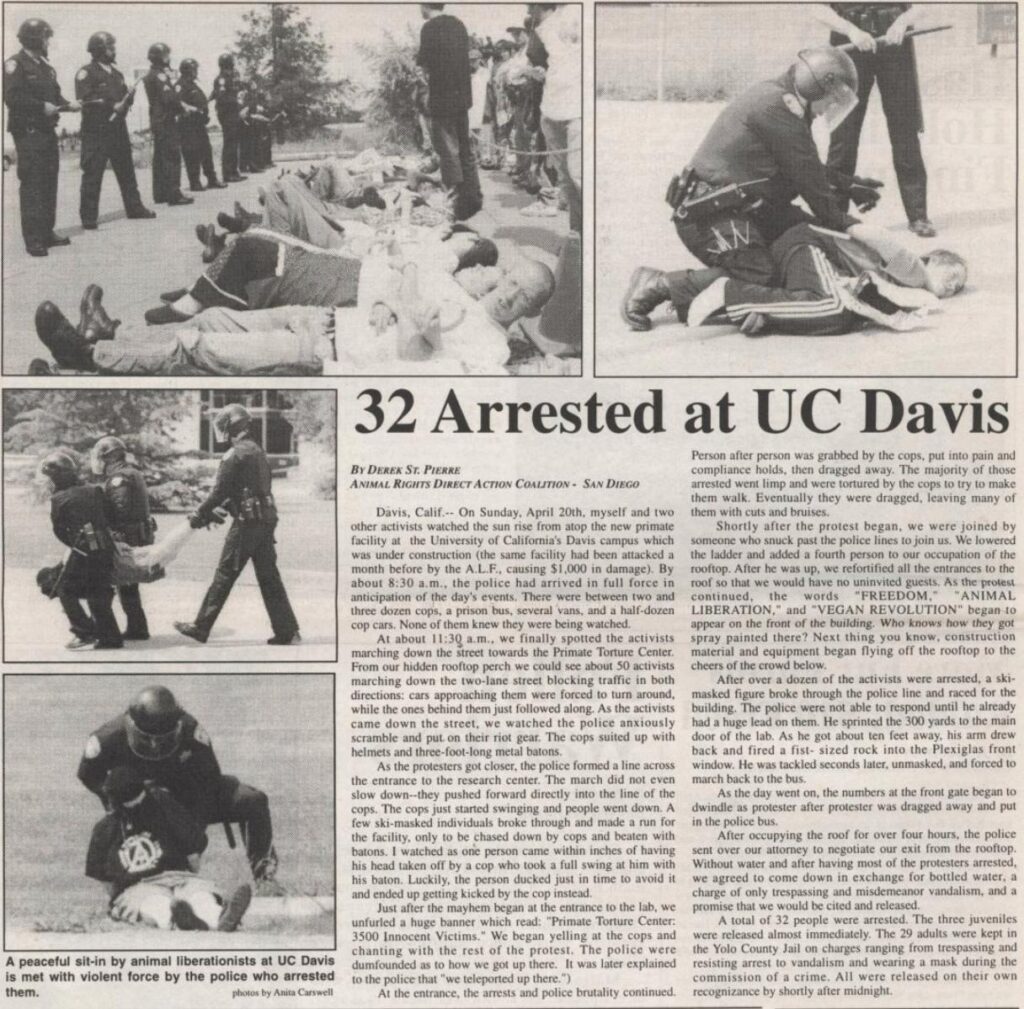
2009: September 24 Walk-Out
Organized across the UCs, the largest walkout in UC history shuts down the first day of classes at Davis and across the UC system to protest austerity programs and tuition hikes. UCD students, faculty, and staff take these actions in solidarity with worldwide university struggles, from Vienna to Athens to Puerto Rico. Multiple locations, including Mrak Hall, are occupied. Teach-ins and skillshares happen while administrators are shouted down and pushed out of every event. Campus struggle is reborn against a backdrop of increasingly desperate and violent repression by the administration. Explicit administrative uses of “free speech” and “civility” discourse attempt to stifle dissent. The campus is ungovernable all fall.
November 19, 2009: Occupation of Mrak Hall
Directly after a day of action and attempted occupation at UCB on November 18, UC Davis students return to campus and begin an occupation of Mrak Hall, the main administrative building on campus. Hundreds of students gather there over the evening, locking the doors open, ordering pizza, and refusing dialogue with the administration. Around 8pm, UCD administration calls in police, who amass in the basement in riot gear. Outside the building, the UCDPD and Davis PD officers gear up their K-9 unit, three police vans, and a police helicopter; indoors, meanwhile, occupiers chant and defy them. One undergrad leaves the building in an attempt to avoid arrest and, once outside, slips on the curb near police officers, who immediately brutalize her, throwing her onto a police car and cuffing her. Riot police inside then arrest 51 students and 1 faculty member and bring charges of assaulting an officer against the student they attacked.
January 12, 2010: Shields Library Banner Drop
A group drops large banners from Shields Library in protest of the UC’s drastic fee increase for students, worker furloughs, and threats to close one of UCD’s four campus libraries. This banner drop is followed a few months later by an unpermitted weekend-long occupation of Shields library, where students keep the building open all night; hold dance parties, workshops, know-your-rights trainings; and serve food to staff and students.
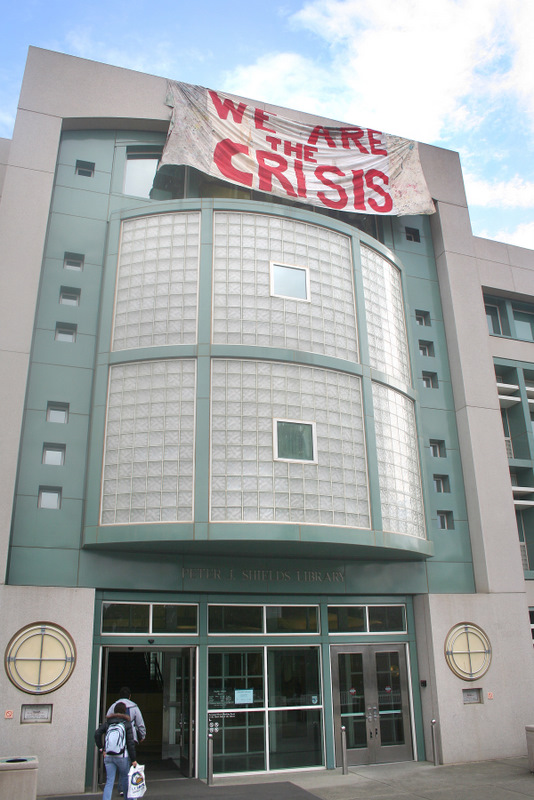
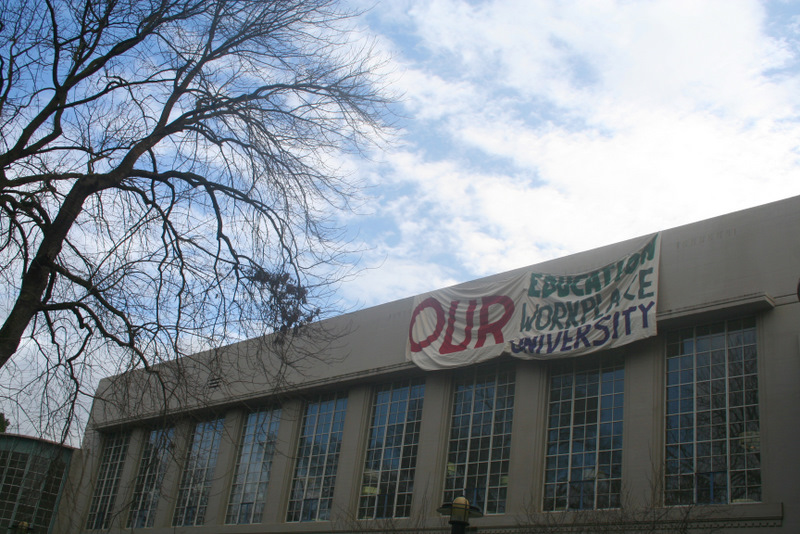
March 4, 2010: Taking the Highway
In opposition to 32% UC fee hikes and the ongoing privatization of higher education, students in Davis plan a rally for noon at the MU, then a march through campus where they pull fire alarms in the library, lecture halls, and dorms, amassing over 400 students who march through campus, shut down Russell Blvd and the Unitrans buses, then head toward the Mondavi Center and the entrance to the I-80. There they are confronted by the CHP, UCDPD, and Yolo Sheriff’s Department forces. At this point, about a quarter mile from the on-ramp, protesters ‘bloc up’ and, using their bodies and bicycles, manage to break through a line of riot police trying to prevent them from accessing the highway. In the stand-off, students are shot at and assaulted with an assortment of less-than-lethal weapons, including pepperballs (glass pellets containing an irritant powder), tasers/stun guns, and batons.
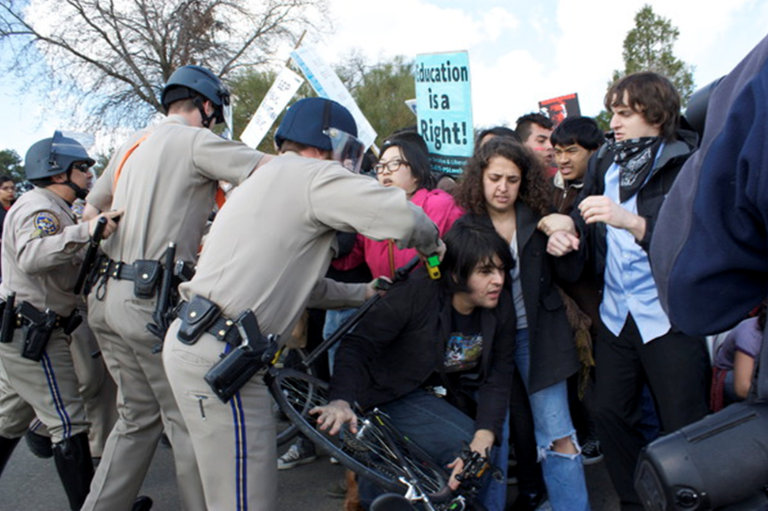
August 2010: US Bank money machines fire bombed and vandalized
Sometime in August, late at night, someone apparently throws a molotov cocktail at this campus ATM, which allegedly catches fire and smolders for hours before a morning janitorial crew member reports it. According to a campus report, the FBI is informed, but so far as we know, no charges are ever filed.
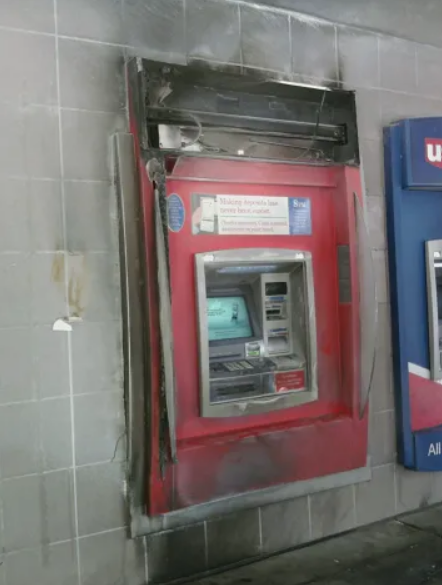
2009-2011: Occupy UC Davis
Before Occupy Wall Street begins, the student movement across the UCs, and then nationwide, is occupying campus buildings and public spaces to protest the 32% fee hikes, furloughs, and cuts to public university funding. The Davis campus sees occupations of Mrak Hall, Dutton Hall, and the Quad near the MU. Students set up tents on the Quad and spend weekends on teach-ins, workshops, and Skype calls with other occupied universities nationally and internationally.
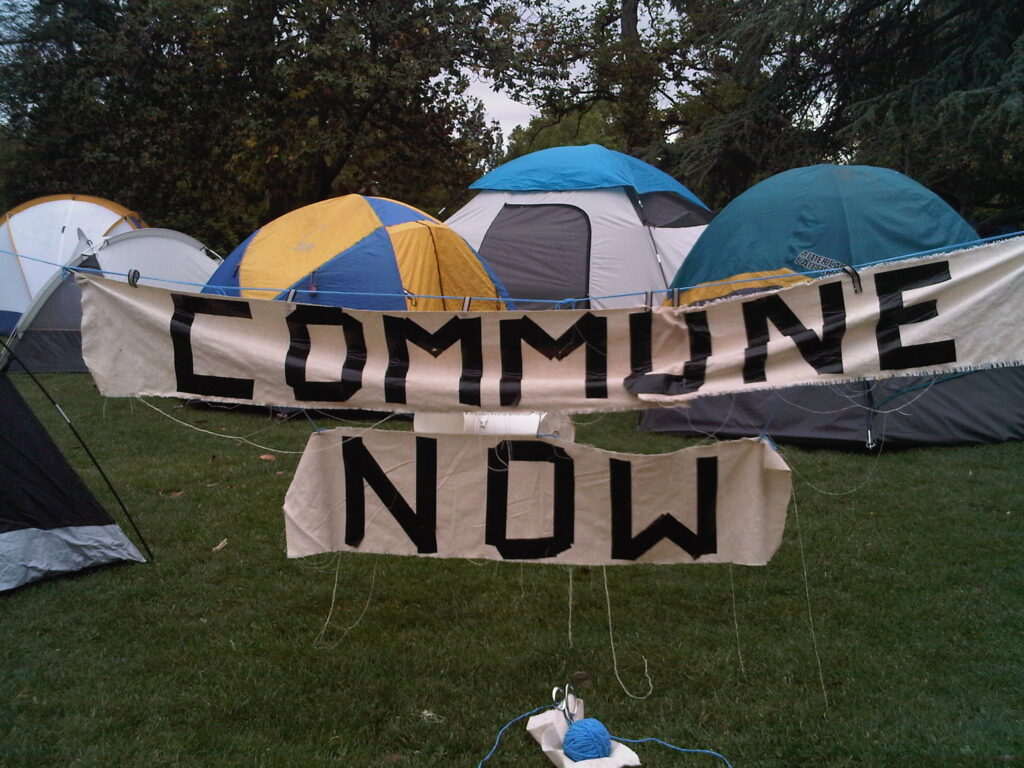
November 18, 2011: Pepper Spray (C/W police violence in text and linked video)
On Friday, November 18th, students again decide to raise tents on the quad and spend the weekend there. Chancellor Linda Katehi, allegedly concerned that out-of-town protesters—especially from Oakland—will join them, orders UCD police to remove all tents before the day’s end. At 3 pm, UCDPD gears up to clear the quad, beginning by arresting four undergrads and grad students. Met with nothing but pushback and disgust, UCDPD calls for aid and begins collecting tents, throwing them in police vehicles. The students gather in the center of the quad and hold a sit-in, refusing to leave. UCDPD, following orders from Officer Annette Spicuzza and, ultimately, Katehi, moves in on the seated students and brings out military-grade pepper spray to disperse them. Sergeant Pike sprays the protesters at close range, even reaching under some protesters’ rain jackets to spray into their faces. Students then surround the officers and shame them off of the quad. The officers will later claim in court that they feared for their lives.
November 19, 2011: Linda Katehi Walk of Shame
After the pepper spray incident makes international news, the chancellor calls a private press conference. Students find and publicize the location, meeting her and the minister whom the university had hired to walk with her. The chancellor and her entourage sneak into a building through the back to film their press release. Students surround and enter the building, getting close enough to pound on the door of the room where she is being filmed. Katehi finally leaves, followed by her lackeys. Students sit down along the only sidewalk and silently stare her down as she makes her exit. Once she leaves, people jump on the cars of her entourage.
November 21, 2011: Say It Don’t Spray It – Katehi Resign!
In response to the pepper spray incident, over 5000 students, instructors, and community members gather on the Quad for a general assembly and rally to demand the resignation of Linda Katehi. At this massive event, three votes are taken, including one on proposing to remove cops from the UC campuses. After the GA, students reoccupy the Quad and remain there until winter break.
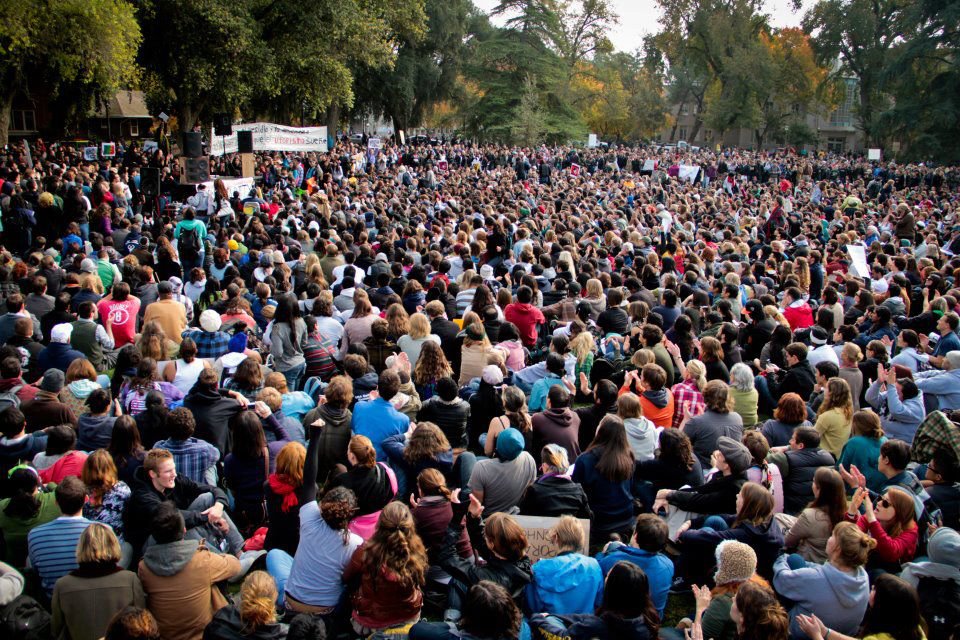
Jan 25-28, 2012: Cross Culture Center Occupation
In one of the more explicitly militant actions taken post-pepper spray, UCD students and lecturers occupy the empty building that previously housed the Cross Cultural Center and hold it as their own for three days. The occupation will be a lesson in student and worker struggle…and in administrative tactics of “soft” repression in the aftermath of their pepper-spray catastrophe. The occupiers block administrators from entering the building. As will later be discovered in court documents during the trial of the Banker’s Dozen, the university enlists other university members to subvert the occupation by pretending that the disused building, vacant for months, is still meant to support underserved students: a practice run for the now-familiar use of “diversity discourse” as an instrument of repression and demobilization — all to extend the least diverse power imaginable, the power that emanates from Mrak Hall and the police station. Meanwhile, the occupiers install a radical library and share anticapitalist and anticolonialist study groups, craft workshops, militant research, and solidarity. And also banner-making, including the large-scale paraphrase of Fanon: REVOLUTION IS THE ONLY CULTURE. Some of the occupiers describe their action in their departing communiqué, “Note from the Revolutionaries (of Color)”:
Three/four days ago when we took over the building, we began with a clear anti-colonial, anti-imperialist, and fundamentally anti-capitalist position. This was made clear when we rejected liberalism (the political supplement to capitalism): 1. We physically blocked media and surveillance into our “autonomous” space, 2. We confronted someone who wanted to sneak in an American flag into the building.
Our message was clear: We do not want administrative presence and the symbol of Empire in our space. We realize full well that the flag represents genocide, war, racism, imperialism, torture, surveillance, and the continued colonization of people (of color). We also understand the history of indigenous struggle in the Americas well enough to know that a proper anti-colonial movement (decolonization) involves the total dismantling of settler-colonialism. We also know that anti-colonialism without anti-capitalism is not a total critique of the given order. We realize that a proper struggle requires us to understand the ideological history of the Americas, the coordinates of indigenous resistance to State violence, and forms of political action that combat the ideology of colonialism. This was the foundation upon which we wanted to begin to build our movement. We knew that the rejection of the flag was symbolic, but nonetheless, we were excited about the tone the movement began to have within that space (a space that also has its own radical history).
2012: US Bank Blockade
Students and faculty members stage a seven-week sit-in at the campus branch of the US Bank to protest and impede the collusion of banks and UC Regents in profiting from student debt and other immoral and predatory loan practices. The occupation effectively closes down the campus branch of the US Bank until they break their lease and leave. In retaliation, the UC Davis administration requests that the Yolo County DA press criminal charges against the 12 bank protesters, with possible sentences of eleven years and one million dollars in penalties — each. The case goes to court, resulting in community service for the “Banker’s Dozen,” aka the Davis Dozen. This period following Occupy and the pepper spray incident sees intensified repression of student dissent, from the highly visible prosecution of the Banker’s Dozen to less public cases against students for graffiti and other low-level offenses.
March-April 2016: Chancellor’s Office Occupation
Students stage a month-long occupation of Chancellor Linda Katehi’s office on the sixth floor of Mrak Hall. Despite the administration’s threats to dismiss the students, it is Katehi who eventually leaves: suspended in April, she later resigns. Following the occupation, the administration permanently modifies Mrak Hall’s elevators and security systems to make the sixth-floor offices inaccessible without a key.
Jan 13, 2017: Shutting Down Milo
Protesters at UC Davis stop a talk by Milo Yiannopoulos and Martin Shkreli, whom the College Republicans have invited to campus. Subsequent protests at Berkeley and UCLA also result in cancellations, deplatforming Milo and shutting down the final leg of his tour.
Winter 2019: COLA Wildcat Strike Starts at UC Santa Cruz
Faced with rising housing costs and stagnant wages, graduate student workers find themselves unable to afford to live in the cities where they work. In defiance of university administrators and UAW2865 leadership alike, the Cost of Living Adjustment (COLA) wildcat strike arises in response to these untenable conditions, first at UC Santa Cruz, and then at UC campuses across the state. Santa Cruz graduate workers begin the strike by withholding grades in December 2019 and later escalate to a full work stoppage in winter 2020. During the winter, the COLA movement expands to include calls for justice for the entire university community. Most notably, the COLA4ALL coalition of undergraduates, led primarily by students of color and undocumented students, joins the strike with their own list of demands. The COLA strike lasts through spring 2020.
February 27, 2020: COLA Wildcat Strike Continues at UC Davis
After months of organizing, UC Davis grad students officially join the COLA wildcat strike, beginning a grading strike in solidarity with UC Santa Cruz. Strikers not only demand a COLA but also call on administrators to fund Ethnic Studies programs fully, disarm campus police, and divest from military and policing in compliance with the Boycott, Divestment, and Sanctions (BDS) movement for Palestinian liberation. Contrary to administrative propaganda about “harming students,” many undergraduates support the grade strike, understanding that their own struggles with fees, food insecurity, and housing costs are continuous with the struggles of the graduate students. Undergraduates also recognize that teacher working conditions are student learning conditions.
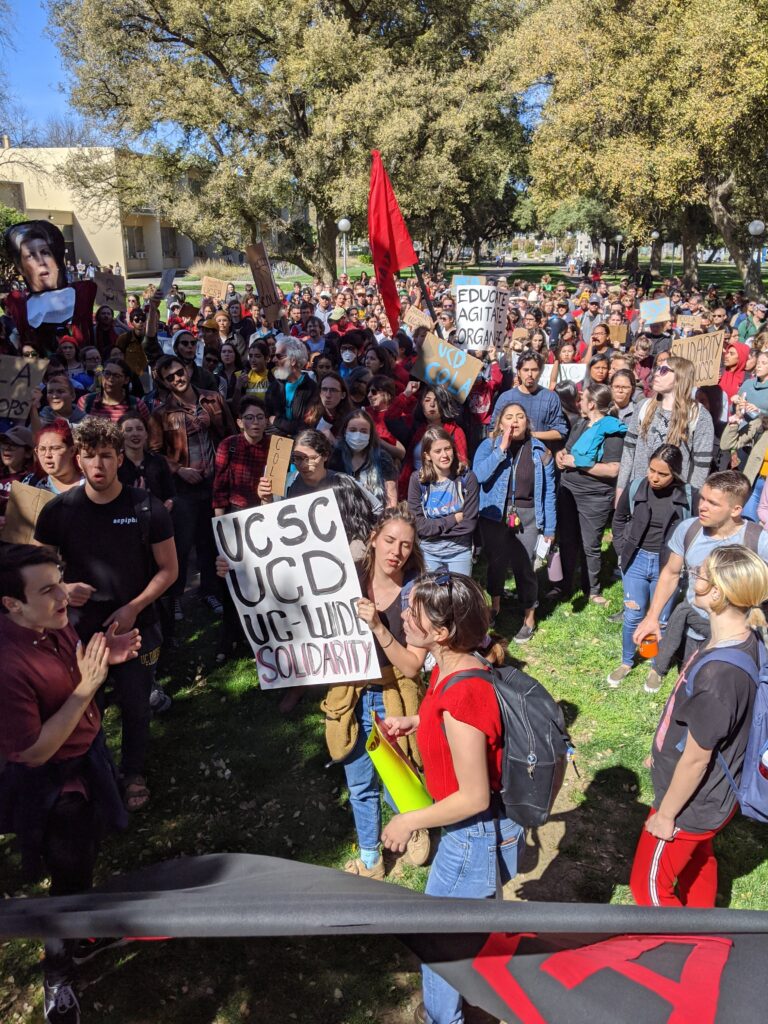
October 1, 2020: UCFTP
Following the death of George Floyd at the hands of Minneapolis police, students, faculty, and staff throughout the UC system unite to create UCFTP, a statewide network of abolitionists dedicated to getting cops off campuses and off the planet. The group begins fall quarter with a statewide day of action in which all ten UC campuses participate. At Davis, UCD Cops Off Campus stops by the police station and drops a three-story tall banner from the adjacent parking structure.
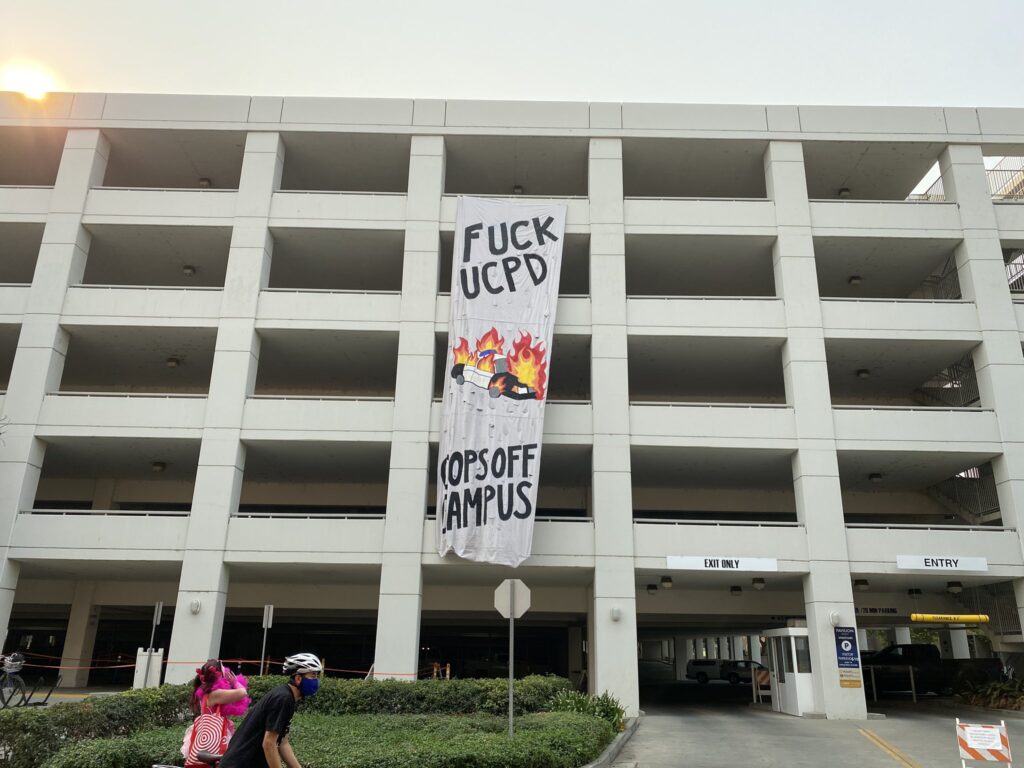
May 24, 2021: Abolition (Gary) May
As the Cops Off Campus movement grows, abolitionists from across the continent coordinate to organize Abolition May. Every day during the month of May, at least one campus hosts an action or other event in support of abolishing campus police. At Davis, campus groups and students in coalition with Cops Off Campus pay a visit to Chancellor Gary May’s house, leaving various calling cards. Student and community groups speak to the crowd about policing, mutual aid, and labor justice.
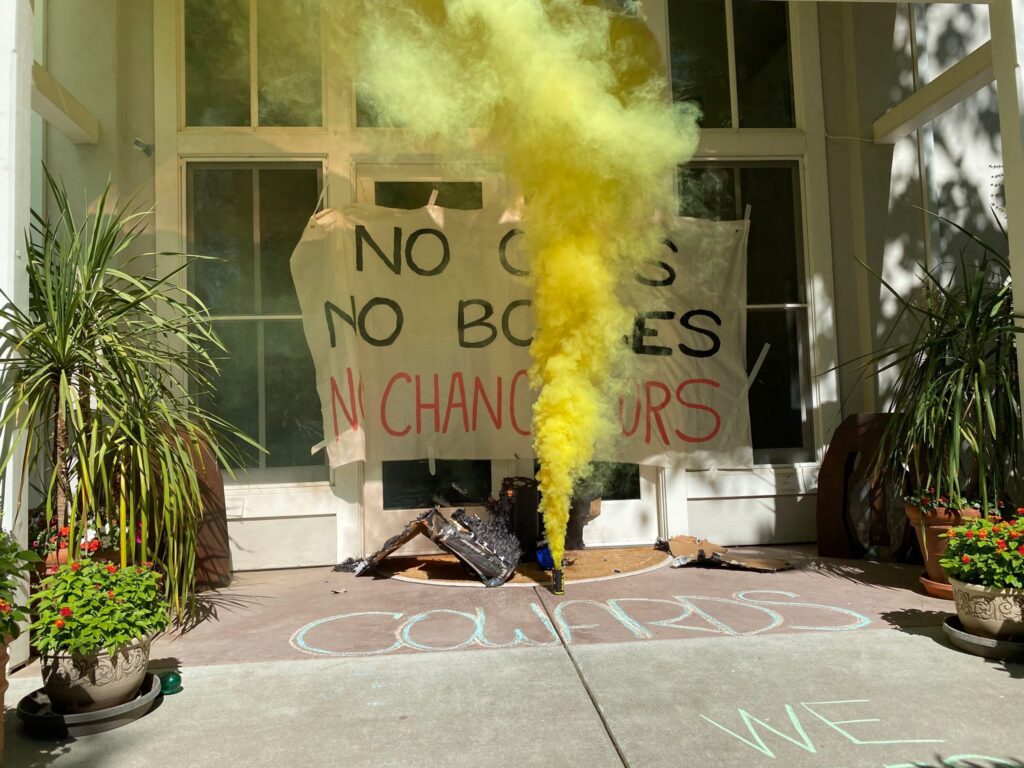
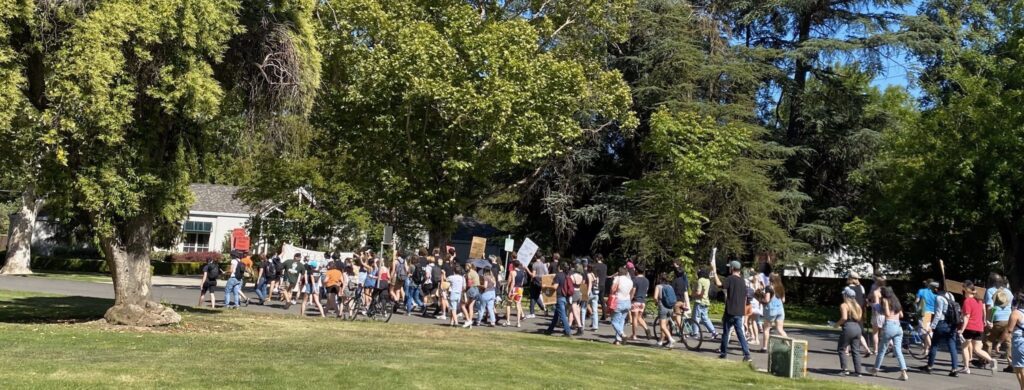
September 2021: A Banner Orientation
Cops Off Campus welcomes students back to Davis with a week of banner drops.
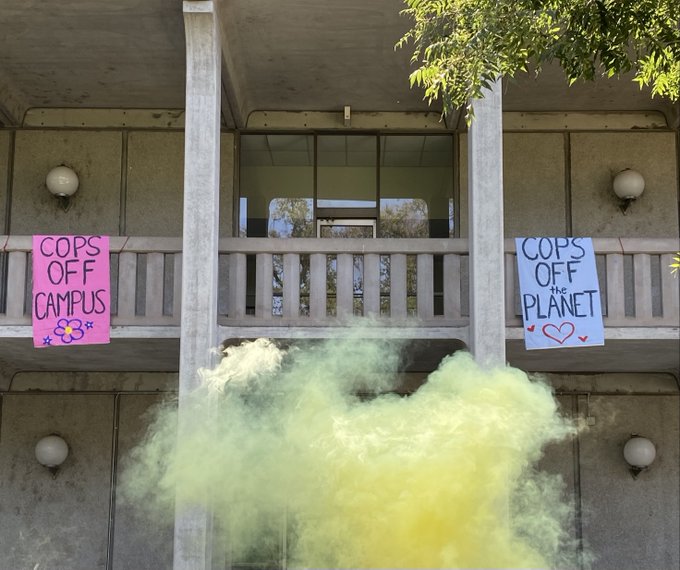
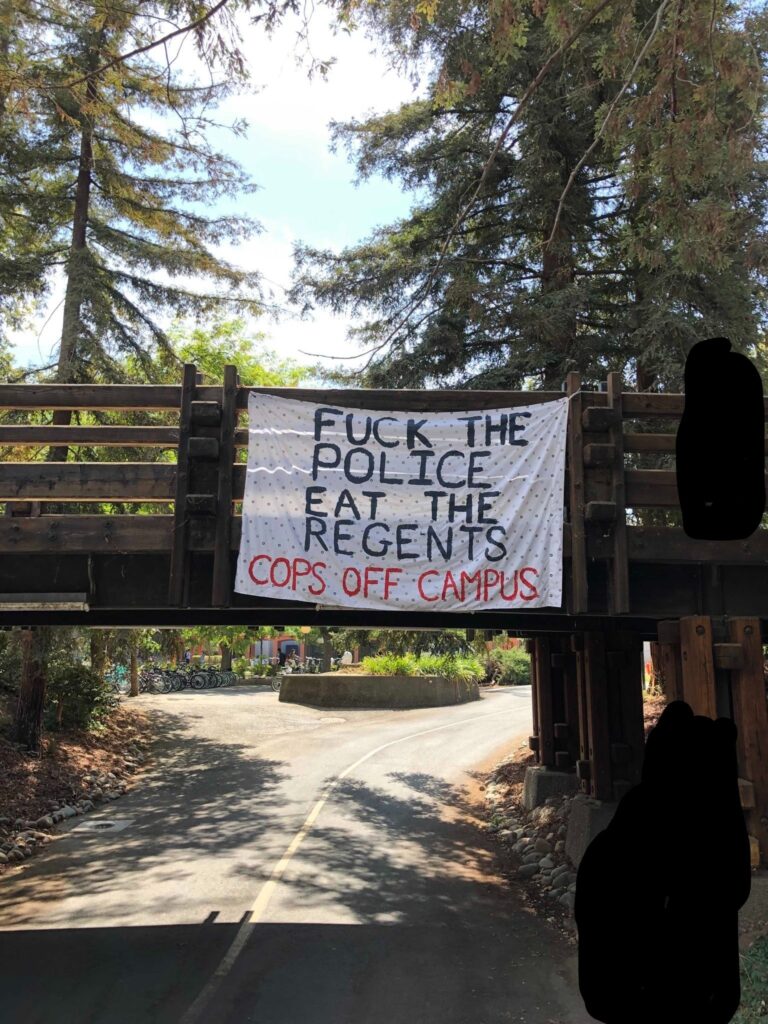
November 18, 2021: 10-year Anniversary of the Pepper Spray Incident
A coalition of student groups gather on the Quad and march to the police station to commemorate the pepper spray incident and call for the abolition of campus police. Later that evening, various locations on campus are decorated with spray paint, including the egghead sculptures.
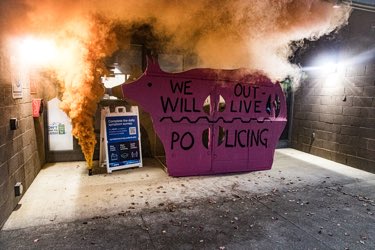
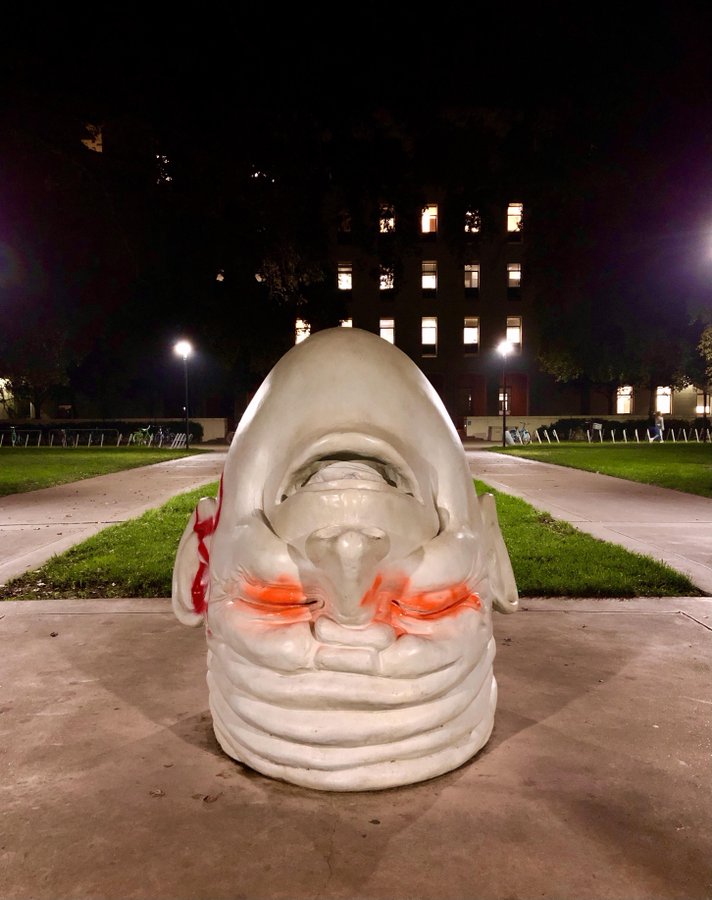
April 12, 2022: Access is Education
In response to not only the COVID pandemic but also a long history of ableist educational policies, Cops Off Campus and the Davis Free Association of Socialists lead a march to Mrak and a rally to demand accessible instruction for all. Speakers participate in person and remotely.
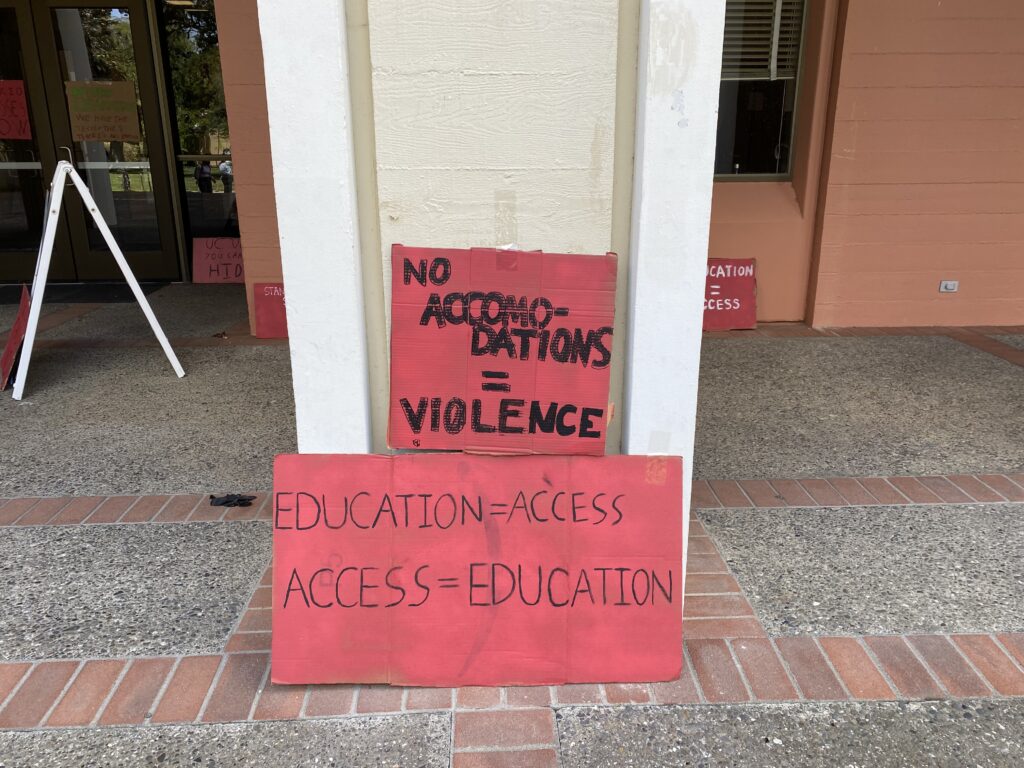
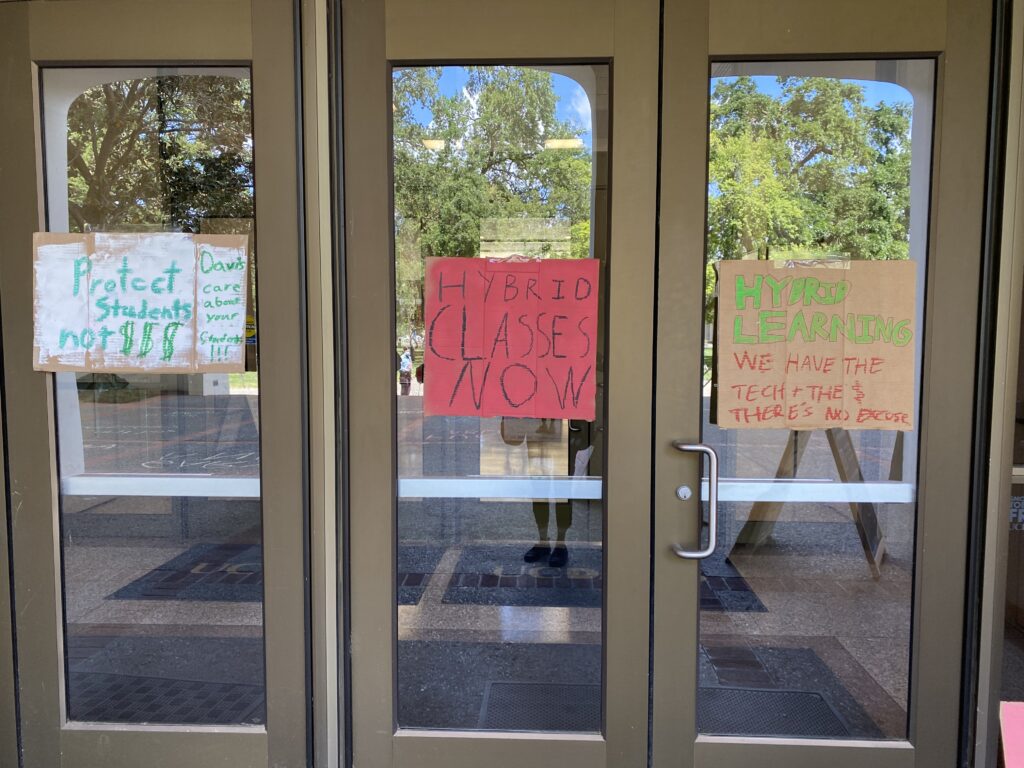
May 18, 2022: Occupation and Liberation of Latitude Dining Commons
Radical campus and community groups surround the card swipe stations at Latitude so that for two hours, everyone who enters the dining hall – students and community members – eats lunch free. A communiqué published from inside the dining hall explains the relationship between policing and food insecurity, as well as between abolition and community care. Those involved in the action describe the dining hall liberation as one small step toward the university they want to see: “Swipe-free, tuition-free, police-free, we are not joking about a free university. Administrator-free too, just as a cherry on top.”
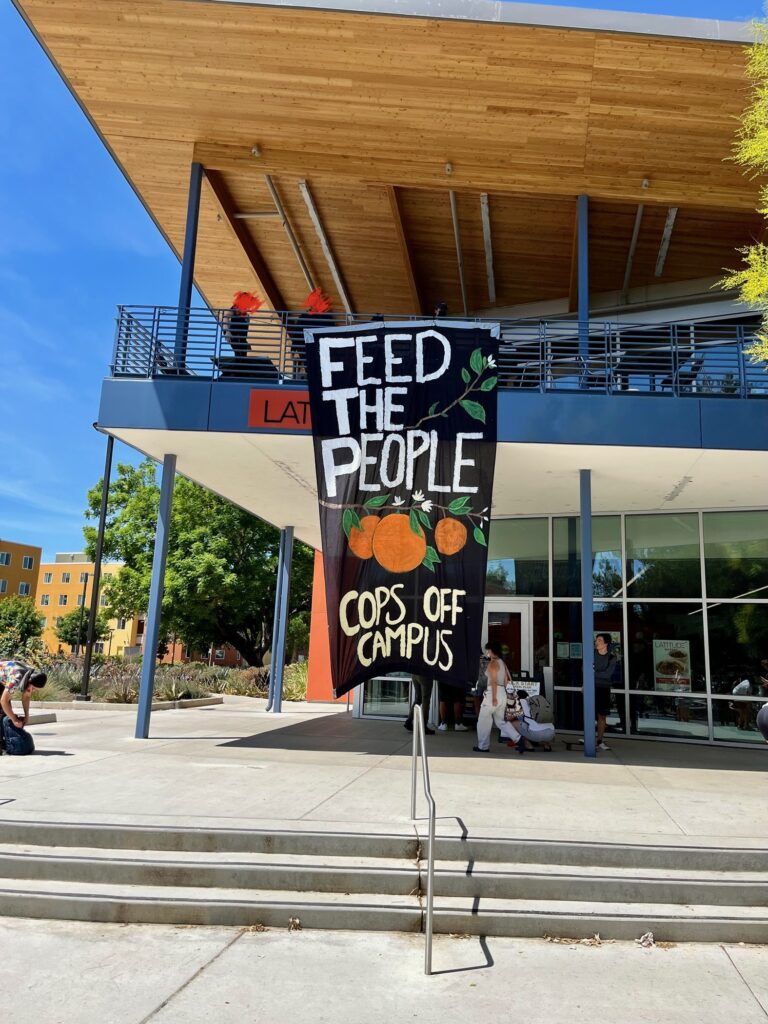
The timeline ends here, but making radical history on the UCD campus doesn’t! Watch for our actions this year, and reach out to join us, or start something of your own. We’ll see you in the streets!